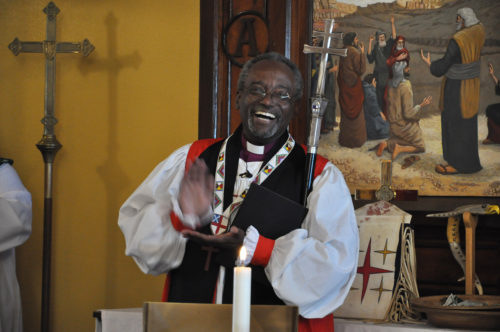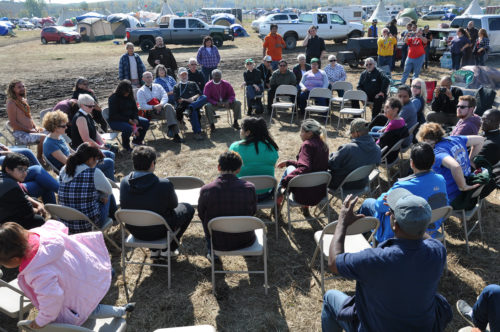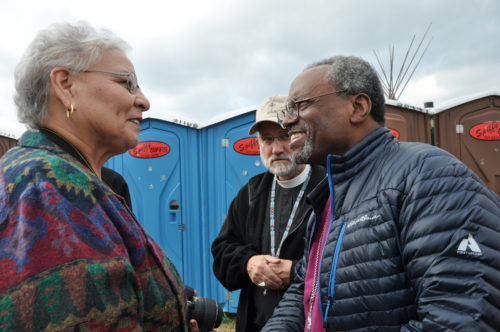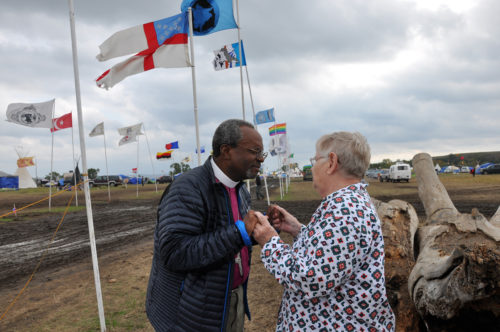Presiding Bishop tells Standing Rock protectors ‘the way of Jesus honors the water’Posted Sep 27, 2016 |
|

Presiding Bishop Michael Curry stands along North Dakota Highway 1806 on Sept. 24 to witness as law enforcement officers arrive at a small anti-Dakota Access Pipeline encampment to arrest people accused of removing no-trespass signs from neighboring ranch land recently purchased by the pipeline construction company. Photo: Mary Frances Schjonberg/Episcopal News Service
Editor’s note: An image gallery of Presiding Bishop Michael Curry’s visit to the Standing Rock Sioux Nation is here.
[Episcopal News Service – Bismarck, North Dakota] Presiding Bishop Michael Curry came to North Dakota Sept. 24-25 to declare in person that he, the Episcopal Church and, most importantly, God stands with the Standing Rock Sioux Nation in its struggle against the Dakota Access Pipeline that will run under their water supply, over its treaty lands and through some of its burial places.
Curry also called for racial reconciliation in the midst of opposition that has at times surfaced the area’s historical tensions between Indians and non-Indians. He engaged Episcopalians, leaders of other churches, Bismarck residents and its mayor in conversations about racism and environmental justice. He urged people to continue talking with each other after he left.
The Rev. John Floberg told Curry that action against the pipeline is a “kairos moment,” a Greek word meaning God’s appointed time to act. The moment, said Floberg, supervising priest of the Episcopal churches on the North Dakota side of Standing Rock, is filled with hope because “God is doing something here” beyond the actual protest.
That something has brought together Standing Rock Indians with members and leaders of at least 250 of the recognized tribes in the United States in an unprecedented show of unity. Many non-Native people have come to join the protests, as well, including Episcopalians from other parts of the country.
And many people are re-exploring how they have traditionally related to each other in the context of the protest that some say is damaging the part of the state’s economy that is dependent on natural-resource extraction, particularly oil and gas, and the jobs the pipeline will provide. Energy Transfer Partners, the Dallas-based company building the pipeline, says construction will create 8,000 to 12,000 local jobs, while the AFL-CIO has pegged the number at 4,500.

Presiding Bishop Michael Curry reacts Sept. 25 to being told that the people of St. James Episcopal Church in Cannon Ball, North Dakota, gathered at the church on Nov. 1, 2015, to watch a broadcast of his installation as the 27th presiding bishop of the Episcopal Church. Photo: Mary Frances Schjonberg/Episcopal News Service
“God is in the movement business,” Curry said during his Sept. 25 sermon at St. James Episcopal Church in Cannon Ball, North Dakota. “If you look at the Bible very carefully, you will discover that God’s usual way of changing the world – even if it’s just inching it along a little bit – is to create a movement of people who will follow his way.”
The presiding bishop cited Abraham and Sarah whom he said God called to share their way of life with others. The movement of peoples that they began resulted in Christianity, Judaism and Islam, the presiding bishop said. He compared the pipeline protest with Moses leading the Hebrews to the Promised Land. God brought down plagues on Pharaoh to protest his refusal to free the Hebrew people from their oppression, Curry said.
“That’s Standing Rock in the Bible. That’s folks standing their ground and saying ‘do not pollute our water,’” he said. “That’s Standing Rock folks saying ‘do not violate our sacred burial places.’”
Then there is the movement Jesus created, Curry said, a movement of people called to practice love, justice, compassion and to try to “look something like Jesus.”
“I’ve got a feeling if we started looking like Jesus, you wouldn’t have to protest here at Standing Rock because the way of Jesus honors the water” through the act of baptism.
Visiting Oceti Sakowin Camp
The previous day, Curry; Floberg; Heidi J. Kim, Episcopal Church missioner for racial reconciliation; the Rev. Charles A. Wynder Jr., missioner for social justice and advocacy engagement; the Rev. Michael Hunn, canon to the presiding bishop for ministry within the Episcopal Church; South Dakota Bishop John Tarrant; and Bishop Mark Narum of the ELCA Western North Dakota Synod traveled to Oceti Sakowin Camp along the Cannonball River near where it flows into the Missouri River. (North Dakota Bishop Michael Smith was traveling overseas on a previously planned trip.)
Curry spoke to pipeline opponents, who prefer to call themselves “protectors,” during the camp’s daily information session. He told them that the Episcopal Church stands in solidarity with them because “water is a gift from the creator.”
“Water means life for all of the children of God, human beings who are gifts of the creator,” Curry said, adding that “your struggle is not just your struggle, it is our struggle; it is the struggle of the human community.”
The approximately 1,172-mile, 30-inch diameter pipeline will deliver as much as 570,000 barrels of light sweet crude oil per day from the oil fields in the Bakken and Three Forks production areas in North Dakota to Patoka, Illinois. The U.S. Army Corps of Engineers issued permits July 26 allowing construction of the pipeline.
Opponents of the pipeline say it poses too great a threat to the environment. The tribe says the pipeline would cross treaty lands, disturb sacred sites and threaten drinking water for 8,000 members who live on the tribe’s nearly 2.3 million-acre reservation. The pipeline would cross under the Missouri River, the tribe’s water source, just outside the Standing Rocking Reservation.
Energy Transfer Partners says the pipeline will provide a “more direct, cost-effective, safer and environmentally responsible” way to transport oil and reduce the current use of rail and truck transportation. At least 42 people were killed in 2013 when a train pulling an estimated two million gallons of crude oil from North Dakota to Canadian refineries derailed in a fiery explosion in Lac-Megantic, Quebec.
Reuters reported Sept. 23 that its analysis of government data on crude oil spills showed that Sunoco Logistics, the company which will run the pipeline once it is operational, has had more pipeline leaks than any of its competitors. Sunoco leaked crude oil from onshore pipelines at least 203 times over the last six years, Reuter reported.

George Fulford of Mandan, North Dakota, right foreground, speaks during a listening time arranged Sept. 24 for Presiding Bishop Michael Curry, center top, at Oceti Skowin Camp. Seated to Curry’s right are South Dakota Bishop John Tarrant and Bishop Mark Narum of the ELCA Western North Dakota Synod. Photo: Mary Frances Schjonberg/Episcopal News Service
Against that backdrop, Curry spent more than an hour sitting in a circle in the Episcopal gathering area at Oceti Sakowin Camp listening to people’s concerns and their hopes for the church’s role in supporting their action.
Rosa Wilson, a Standing Rock Episcopalian, was one of many people who spoke. She described the discrimination she has experienced, including getting beaten up high school and being followed by storeowners in Bismarck when she was young because they thought she would shoplift because she was an Indian.
“What can we do; what can we do to try to make it better? I don’t know if in prayer God will listen to us,” she said. “After 74 years I just have to respect everybody that comes my way and just be a person that gives out love.”

The Oceti Sakowin Camp spreads out along the north side of the Cannonball River on the Standing Rock Sioux Reservation. This is the view from Facebook Hill, where media have gathered, where people can charge their electronic devices at a truck with solar panels and where one can sometimes get a cell phone signal. Photo: Mary Frances Schjonberg/Episcopal News Service
One woman came into the circle to challenge church members about their motives in coming to the camp, repeatedly asking what they wanted and whether their goal was to convert Indians.
The Rev. Lauren Stanley, Episcopal priest-in-charge on the Rosebud Indian Reservation in South Dakota, said her eight churches were there to support the protestors however they needed support. When Rosebud Episcopalians heard that the camp needed wood, her church members delivered five cords, she said. They also brought food to the camp and are working to get a generator.
Told on the day of Curry’s visit that the camp needed another log splitter, Stanley said she asked the presiding bishop to pay for it. “So, we’ll have one here in two weeks,” she said.
“Our goal is not to tell anyone anything; our goal is to support you,” she said.
“We are not here to convert you. We are not. We are not the old Christians,” Stanley told the woman, meaning the ones who required Indians to become Christians.
Conversation about struggling with diversity and racism
Before heading to the camp that morning Curry met with local community, educational and religious leaders for a breakfast conversation about the impact of the growing protest on the area and the history of race relations there.
Bismarck Mayor Mike Seminary told Curry that about 4,000 the capital city’s 67,000 residents are Native Americans. Non-Native residents “are kind of in denial, and we’re comfortable with that” when it comes to dealing with diversity, he said.

South Dakota Bishop John Tarrant, center, Sept. 24 introduces Presiding Bishop Michael Curry to Linda Simon, who attends St. Mark’s Episcopal Church in Aberdeen, South Dakota. Simon, a member of the Cheyenne River Sioux Tribe, was at Oceti Sakowin Camp for the first time. Photo: Mary Frances Schjonberg/Episcopal News Service
He described a meeting with business leaders a few years ago before he became mayor to talk about efforts to fill what were then 7,500 open jobs in the city. The business people discussed going to job fairs in large cities to attract job seekers, Seminary said. When he asked whether they had tried to recruit among local Indians, the mayor said he ran up against unspoken stereotypes about Indians’ employability.
Seminary worshipped at St. James the next day and spoke to the congregation, bringing his pledge of solidarity and his assurance that he prayed each day for the people of Standing Rock. During the Sept. 24 breakfast meeting, he said that any time Natives and non-Natives come together it’s a way to build relationships. Those relationships could bring the community to a time when the sight of Natives and non-Natives working together would be unremarkable, he said.
That night back in Bismarck, an hour north of the camp, Curry joined close to 50 people at St. George’s Episcopal Church to talk about racism. It was a not-always-comfortable conversation with some tribal members speaking of discrimination they had experienced or witnessed in the city and other participants speaking about their perception of racism and their response to it.
Carmen Goodhouse, a full-blooded Hunkpapa Lakota and a third-generation Episcopalian, said “we were taught that we would always have to defend ourselves because of racism” and not enough has happened to eliminate racism in the area. The Jesus Movement is needed in North Dakota, she said, because “aside from asking Jesus” she doesn’t know how things will change.
Dominic Hanson said he “completely understand[s] that there’s been a lot of racism towards the Natives” but, he said he’s also seen “a lot of racism from the Natives towards whites in general and other races.”
People ought to be open to the possibility that “it’s not a white issue that we aren’t connecting,” Hanson said.
“I think that, as a whole, nobody’s really opening up to anyone and wanting to make those connections,” he said. “And that’s why we’re here today. We’re willing to open up.”
Protests spread through and beyond the reservation
The Diocese of North Dakota has rallied behind the anti-pipeline cause. It issued a statement of support Aug. 19 and diocesan members have been in the three protest camps helping build a unified presence and helping with material needs. Curry followed with a supportive statement, calling the protest action “one that joins the fight for racial justice and reconciliation with climate justice and caring for God’s creation as a matter of stewardship.” The nine Episcopal churches on Standing Rock Reservation issued a letter Sept. 5 expressing their solidarity with the Sioux Nation.

Leona Volk, of St. Mark’s Episcopal Church in Aberdeen, South Dakota, greets Presiding Bishop Michael Curry Sept. 24 at Oceti Sakowin Camp. Volk has grandchildren who live on the Standing Rock Sioux Reservation near where the Dakota Access Pipeline would pass. “It’s got to stop here, now,” she said. Photo: Mary Frances Schjonberg/Episcopal News Service
The rallies and protests have gone beyond North Dakota. Clean-water advocates, allies of indigenous peoples and supporters of the No Dakota Access Pipeline movement, hashtag #NoDAPL, have staged rallies across the country. The action has attracted the attention of Congress, the United Nations Working Group on Indigenous Populations and celebrities.
In a 48-hour span last week Tribal Chairman Dave Archambault II testified in Geneva, Switzerland, at the U.N. Human Rights Council and in Washington, D.C., in front of the U.S. House of Representatives’ natural resources committee. The U.N. rights group said Sept. 22 after Archambault’s testimony that the United States should stop construction on the pipeline because of its environmental and cultural threats, and because the Standing Rock Sioux Nation had not been treated properly during the permitting process.
Archambault was scheduled to be at St. James on Sept. 25 but Floberg said he was in Washington, D.C. dealing with pipeline issues.
As of Sept. 26, close to 1,300 archeologists, museum officials, academics and students have signed on to a letter addressed to the Obama administration calling for a thorough environmental impact statement and cultural resources survey of the pipeline’s route in proper consultation with the Standing Rock Sioux Tribe.
A battle fought in the courts
Meanwhile, a federal appeals court on Sept. 16 ordered Energy Transfer Partners to stop construction within 20 miles of Lake Oahe, the dammed section of the Missouri River under which the pipeline will pass, to allow the court more time to consider the Standing Rock Sioux Tribe’s request for an emergency injunction to prevent further destruction of sacred sites within 20 miles on both sides of the lake.
The tribe requested the emergency injunction after U.S. District Court Judge James Boasberg Sept. 9 denied its request for a preliminary injunction to halt construction of the pipeline while the tribe’s lawsuit against the U.S. Army Corps of Engineers for permitting the pipeline is being considered.
Within hours of the Sept. 9 ruling, three federal agencies said they would stop construction and asked Energy Transfer Partners to “voluntary pause” work on government land, land that tribal officials say contains sacred burial sites and artifacts.
The federal agencies also said that the case highlights the need for serious discussion regarding reform aimed at incorporating tribes’ views on such infrastructure projects, including better ways to include tribes’ input about land and resource protections, and treaty rights. The agencies will “invite tribes to formal, government-to-government consultations.” The National Historic Preservation Act requires that level of consultation with tribes.
The situation in and near the camps continues to evolve. On Sept. 22 Energy Transfer Partners bought more than 6,000 acres, including land involved in one of the few violent incidents of the protest, from ranchers David and Brenda Meyer, the Bismarck Tribune reported. Protestors clashed with private security guards hired by Energy Transfer Partners on Sept. 3 as the company began to dig on land the tribe had told the court the day before was sacred and has served as a burial ground. Law enforcement officials said four security guards and two guard dogs were injured, while a tribal spokesman said the dogs bit six people and at least 30 people were pepper-sprayed, the Associated Press reported.
The Bismarck paper said the Meyers told a local television station that they sold the land for liability reasons, that there were too many people on his property all the time and that it was a beautiful ranch but he “just wanted out.”

A North Dakota State Trooper records members of the presiding bishop’s staff as they stand along North Dakota Highway 1806 on Sept. 24 while law enforcement officers arrest two men at a small anti-Dakota Access Pipeline encampment. Photo: Mary Frances Schjonberg/Episcopal News Service
Two days later, the presiding bishop and his staff stopped along North Dakota Highway 1806 on Sept. 24 on their way back to Bismarck to witness as law enforcement officers arrived in nine vehicles at a small pipeline protest encampment. As a helicopter circled overhead, they calmly arrested two men, accusing them of removing no-trespassing signs from the fences bordering the disputed land. Officers and protestors recorded each other’s actions. One state trooper also recorded members of the presiding bishop’s staff as they stood along the highway.
– The Rev. Mary Frances Schjonberg is an editor and reporter for Episcopal News Service.

Social Menu